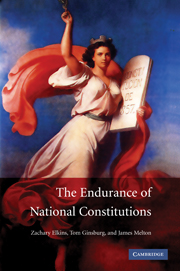Book contents
- Frontmatter
- Contents
- Preface
- 1 Introduction
- 2 How Long Should Constitutions Endure?
- 3 Conceptualizing Constitutions
- 4 What Makes Constitutions Endure?
- 5 Identifying Risks to Constitutional Life
- 6 An Epidemiological Analysis of Constitutional Mortality
- 7 Cases of Constitutional Mortality, Part I: Similar Contexts, Contrasting Outcomes
- 8 Cases of Constitutional Mortality, Part II: Contrasting Contexts, Similar Outcomes
- Conclusion
- Appendix
- References
- Index
2 - How Long Should Constitutions Endure?
Published online by Cambridge University Press: 05 June 2012
- Frontmatter
- Contents
- Preface
- 1 Introduction
- 2 How Long Should Constitutions Endure?
- 3 Conceptualizing Constitutions
- 4 What Makes Constitutions Endure?
- 5 Identifying Risks to Constitutional Life
- 6 An Epidemiological Analysis of Constitutional Mortality
- 7 Cases of Constitutional Mortality, Part I: Similar Contexts, Contrasting Outcomes
- 8 Cases of Constitutional Mortality, Part II: Contrasting Contexts, Similar Outcomes
- Conclusion
- Appendix
- References
- Index
Summary
The bicentennial of the 1787 Constitutional Convention in Philadelphia was met with much fanfare. Historians penned suitably reverential retrospectives, Independence Hall allowed its visitors to sign (virtually) the constitutional text themselves, and media outlets everywhere used the opportunity to revisit the founding and evolution of the document. Some observers, however, were not so buoyant in their reactions. In a typically iconoclastic piece, Thurgood Marshall (1987: 5) suggested that Americans were less indebted to the framers than “to those present who refused to acquiesce in outdated notions of ‘liberty,’ ‘justice,’ and ‘equality.’” Despite Marshall's dissent, the majority opinion seems to amount to a vindication of Madison's call for the preservation of the Philadelphia bargain. But, after 200 years of constitutional births and deaths around the world, we are in a position to address some intriguing counterfactuals. Would the United States (and any other country) be better off had it wholly replaced the Constitution with an upgraded document? Would the country have been as prosperous, as democratic, as stable? Would our higher law “fit” the norms and customs of today's citizens better? Would the substituted document have the same degree of sanctity and inviolability as higher law? What would be the implications for national identity or the economic and political institutions that have grown around the older document? In this chapter, we revisit the original arguments of Jefferson and Madison, as well as those of like-minded theorists, and evaluate the various claims against the historical record.
- Type
- Chapter
- Information
- The Endurance of National Constitutions , pp. 12 - 35Publisher: Cambridge University PressPrint publication year: 2009

